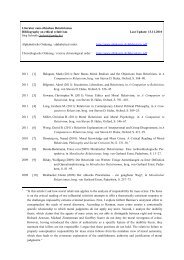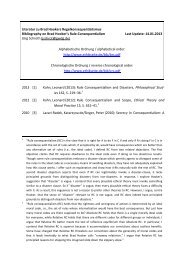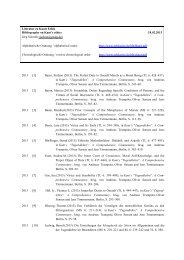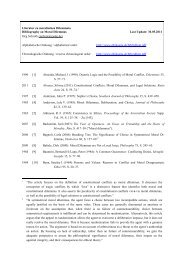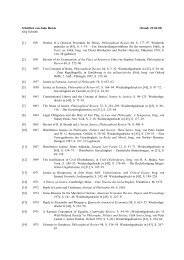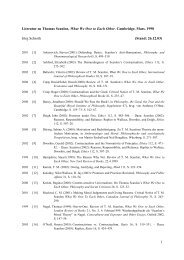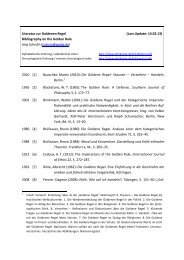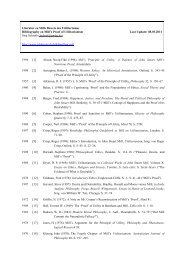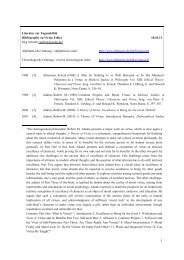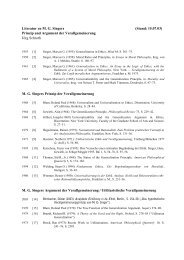Literatur zu Kants Ethik - Ethikseite
Literatur zu Kants Ethik - Ethikseite
Literatur zu Kants Ethik - Ethikseite
You also want an ePaper? Increase the reach of your titles
YUMPU automatically turns print PDFs into web optimized ePapers that Google loves.
2009 [260] Fahmy, Melissa Seymour (2019): Active Sympathetic Participation: Reconsidering Kant’s<br />
Duty of Sympathy, Kantian Review 14, S. 31–52.<br />
2010 [261] Fahmy, Melissa Seymour (2010): Kantian Practical Love, Pacific Philosophical Quarterly 91,<br />
S. 313–31. 29<br />
1982 [262] Feil, Ernst (1982): Autonomie und Heteronomie nach Kant. Zur Klärung einer signifikanten<br />
Fehlinterpretation, Freiburger Zeitschrift für Philosophie und Theologie 29, S. 389–<br />
441.<br />
2000 [263] Fairbanks, Sandra Jane (2000): Kantian Moral Theory and the Destruction of the Self.<br />
Boulder.<br />
1978 [264] Feldman, Fred (1978): Introductory Ethics, Englewood Cliffs, N. J., S. 97–134 (“Kant I”,<br />
“Kant II”).<br />
2009 [265] Feldmeijer, Frits Reitze (2009): Trying to Understand Kant’s Ethical Views, Journal of Value<br />
Inquiry 43, S. 221–41.<br />
2008 [266] Fenner, Dagmar (2008): <strong>Ethik</strong>. Wie soll ich handeln?, Tübingen, S. 100–106 („<strong>Kants</strong><br />
Verfahren logischer Universalisierung“).<br />
2008 [267] Ferreira, Sofia Helena Gollnick (2008): Kant’s Concept of Moral Character, in Recht und<br />
Frieden in der Philosophie <strong>Kants</strong>. Akten des X. Internationalen Kant-Kongresses,<br />
Band 3: Sektionen III–IV, hrsg. von Valerio Rohden, Ricarda R. Terra, Guido A. de<br />
Almeida und Margit Ruffing, Berlin, S. 107–15.<br />
1987 [268] Finnis, John (1987): Legal Enforcement of “Duties to Oneself”: Kant vs. Neo-Kantians,<br />
Columbia Law Review 87, S. 433–56.<br />
1981 [269] Firla, M. (1981): Untersuchungen <strong>zu</strong>m Verhältnis von Anthropologie und Moralphilosophie<br />
bei Kant, Frankfurt a. M./Bern.<br />
1983 [270] Fischer, Norbert (1983): Tugend und Glückseligkeit. Zu ihrem Verhältnis bei Aristoteles und<br />
Kant, Kant-Studien 74, S. 1–21.<br />
1988 [271] Fischer, Norbert (1988): Der formale Grund der bösen Tat. Das Problem der moralischen<br />
Zurechnung in der praktischen Philosophie <strong>Kants</strong>, Zeitschrift für philosophische<br />
Forschung 42, S. 18–44.<br />
2003 [272] Fischer, Peter (2003): Moralität und Sinn. Zur Systematik von Klugheit, Moral und<br />
symbolischer Erfahrung im Werk <strong>Kants</strong>, München. 30<br />
29 “In the Doctrine of Virtue Kant stipulates that ‘Love is a matter of feeling, not of willing . . . so a duty to<br />
love is an absurdity.’ Nonetheless, in the same work Kant claims that we have duties of love to other human<br />
beings. According to Kant, the kind of love which is commanded by duty is practical love. This paper<br />
defends the view that the duty of practical love articulated in the Doctrine of Virtue is distinct from the duty<br />
of beneficence and best understood as a duty of self-transformation, which agents observe by cultivating a<br />
benevolent disposition and practical beneficent desires.”<br />
30 „Nicht historisierend, wie es in der Kant-Exegese <strong>zu</strong>meist geschieht, sondern in systematischer Absicht<br />
wird <strong>Kants</strong> Moralphilosophie aus dem Kontext seines Gesamtwerkes der kritischen Periode interpretiert. So<br />
werden jene Themenbereiche erschlossen, die eine jede <strong>Ethik</strong> berücksichtigen muß, wenn sie als systematisch<br />
vollständig gelten möchte. Dadurch werden neue Sichtweise auf traditionelle Probleme der <strong>Ethik</strong>



